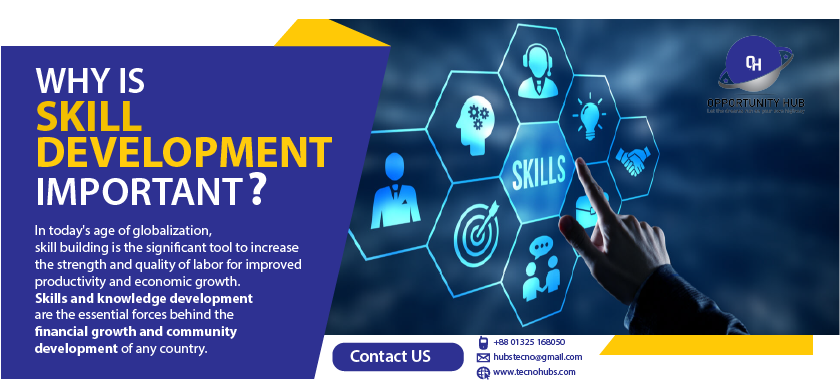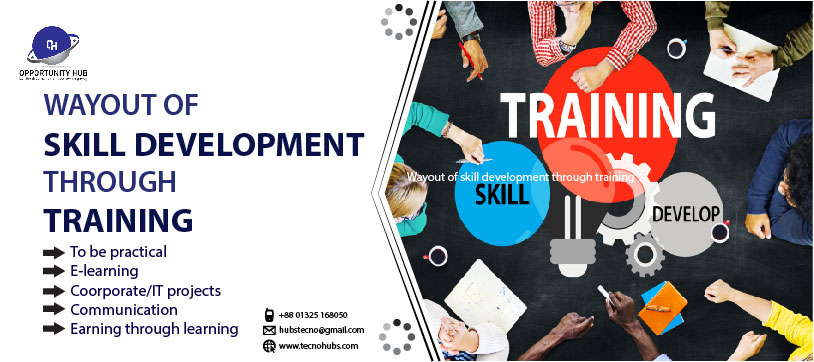
WHAT IS SKILL?
A skill is the ability to perform a task in a competent manner within a prescribed span, energy, or both. Skills can be classified as general and specific. For example, in the domain of work, some general skills consist of time management, teamwork, leadership, self-motivation etc. Whereas specific skills are required only for a particular job. Skill requires certain environmental stimuli and situations to assess the level of skill being shown and used.

Types of Skills:
1. Functional Skills: In these skills, the actions are taken to perform a task. They are transferable to different work. They are based on ability and aptitude. They denote the functions like to organize, to promote, to analyze etc.
2. Personal Traits Skills: It contributes personal traits or attitudes such as patience, diplomacy, result-orientation and independence to perform work. It is developed in childhood and through life experience.
3. Knowledge Based Skills: These skills can be acquired through education, training and on the job experience. They help to perform a particular task. The person should have the knowledge of specific subjects, procedures etc. 4. Labor Skills: Skilled workers are active, energetic and economically productive. They are of great demand abroad due to their caliber, potential and skills.
5. Life Skills: An ability and capacity acquired through deliberate, systematic, and sustained effort to smoothly and deceptively carry out complex activities involving ideas (cognitive skills), things (technical skills), and/or people (interpersonal skills).
6. People Skills: It is the ability to communicate effectively with people in a friendly way, especially in business. It includes both social and psychological skills. People skills means to understand ourselves and to moderate our responses, to talk effectively and empathize accurately and to build relationships of trust, respect and productive interactions.
7. Social Skills: It is any sort of skill which facilitates interaction and communication with others. In social skills, social rules and relations are created, communicated and changed in verbal and nonverbal ways.
8. Soft Skills: The combination of interpersonal skills, social skills, communication skills, character traits, attitudes, career attributes and emotional Intelligence Quotient (EQ) among others.
9. Hard Skills: Hard skills are any skills relating to a specific task or situation. What is a Skill Development Programme? Pradhan Mantri Kaushal Vikas Yojana (PMKVY) is the flagship scheme of the Ministry of Skill Development & Entrepreneurship (MSDE). The objective of this Skill Certification Scheme is to enable a large number of Bangladeshi youth to take up industry relevant skill training that will help them in securing a better livelihood.
Why is Skill Development necessary?
In today’s age of globalization, skill building is the significant tool to increase the strength and quality of labor for improved productivity and economic growth. Skills and knowledge development are the essential forces behind the financial growth and community development of any country. Skill building is a powerful equipment to empower individuals and improve their social acceptance. It must be complemented by economic growth and employment
opportunities to meet the rising aspirations of youth. It is an important ingredient to push the production possibility front line outward and to take the growth rate of the economy to a higher route. The challenge lies not only in a huge quantitative expansion of facilities for skill training, but also in raising their quality. Bangladesh can then become the global sourcing hub for skilled employees. Bangladesh’s target is to become a global economic powerhouse. In order to attain this goal, it should equip its workforce with employable skills and knowledge.Today, the world and Bangladesh need a skilled workforce. If we have to promote the development of our country then our mission has to be skill development and ‘Skilled Bangladesh’. Millions and Millions of Bangladeshi youth should acquire the skills which could contribute towards making Bangladesh a modern country. I also want to create a pool of young people who are able to create jobs and the ones who are not capable of creating jobs and do not have the opportunities, they must be in a position to face their counterparts in any corner of the world while keeping their heads high by virtue of their hard work and their expertise of hands and win the hearts of people around the world through their skills. We want to go for the capacity building of such young people.”
The Importance of Life Skills:
In a constantly changing environment, life skills play an important role to meet the challenges of everyday life. The dramatic changes in global economies over the past five years have been matched with the transformation in technology and these are all impacting on education, the workplace and our home life. To cope with the increasing pace and change of modern life, students need new life skills such as the ability to deal with stress and frustration. Today’s students will have many new jobs over the course of their lives, with associated pressures and the need for flexibility. Life Skills are important at three levels: for the individual, for employment and for society.
1. For the Individual: In everyday life, the development of life skills helps students to: find new ways of thinking and problem solving, to identify the impact of their actions and teach them to shoulder the responsibility, to build confidence and to analyze options and to make decisions and to develop a sense of self awareness and appreciation for others.
2. For employment: It’s simply a disgusting fact that our students get good marks/grades and still struggle for employment. The recruiters evaluate their academic success (hard skills) as well as employability skills (soft skills). The employability skills consist of: time management, ability to self- manage, working as a part of a team, adaptability to different roles, the potential to lead by influence and ability to understand the business environment.
3. For society: It is rightly said that: “The more we develop life skills individually, the more these affect and benefit the world in which we live”. While dealing with society, the students should recognize cultural awareness. They must respect diversity which allows creativity and imagination. It ultimately results in developing a tolerant society. In order to build resolutions, it is the prime duty of students to develop negotiating skills and to empathize.
Importance of Skill Development in School Education:
Skill development is necessary from a young age so that Bangladesh can create ideal employees in the late century. In the changing world scenario with regard to industry and the job market, there is now an overpowering need for skilled workers. In order to enhance the employ ability of today’s youth, it is most important to educate and train them to acquire the skills. As per market survey, about 90 per cent of employment opportunities require vocational skills. Only 20 percent of our graduates get employed. The rest are unable to get suitable employment due to the lack of employable skills. In the present context of globalization, the demand for skilled and multi skilled workers has increased. Therefore in the context of developing countries, such as Bangladesh, there is a critical need for quality skill development and training. Some of the prominent employable skills that employers seek are: communication skills (verbal and written), commercial awareness, attitude towards work, lifelong learning, self management, teamwork, problem solving, initiative, self-motivation, adaptability, stress management, creativity, interpersonal sensitivity, technology/IT skills etc. Dr. Lakshmi Mohan, Campus Head, ITM Business School asserts, “The pedagogy has to be practical, learning can be enhanced through field visits, e-learning, industry driven projects, digital inputs and so on.”
How to carry out Skill Development in School Education:
Integration of skill development and education is essential for skilling to take wings. It has to be imparted in schools and colleges alongside academics. Introduction to skill training at a young age will by all means give the student an opportunity to explore various options.
1. At school level, there must be options available for skill development courses and they must be provided in the secondary stage of schooling
2. Many more courses in fields such as Hospitality and Tourism, Handicraft, Healthcare, Textiles, Photography, IT, Retail, Banking, Insurance can be added that would interest students to learn from.
Quality of ‘Skill Bangladesh’:
1. The aim of Skill Bangladesh is to guide the youths in a manner so that they get employment or start their own business.
2. Skill Bangladesh provides scope not only for the upcoming generation but it also provides training options for the traditional type occupations such as carpenters, welders, cobblers, tailors, nurses etc.
3. Skill Bangladesh provides need-based programmed for the certain age groups which can be the communication or language skills, personality development skills, behavioral skills and job-employ ability skills.
CONCLUSION:
Due to the competition in the global economy, industries and firms in developed and developing countries look for an employee with higher level of skills, who can engage in innovative tasks, and can improve the quality and services of their company. It is the need of hour to improve the mental and physical development of the Bangladeshi youth so that they can be employed and move forward towards the targeted results. As the Bangladeshi youth is the ‘future’ of the country, they should also be skilled enough to create a ‘future’.